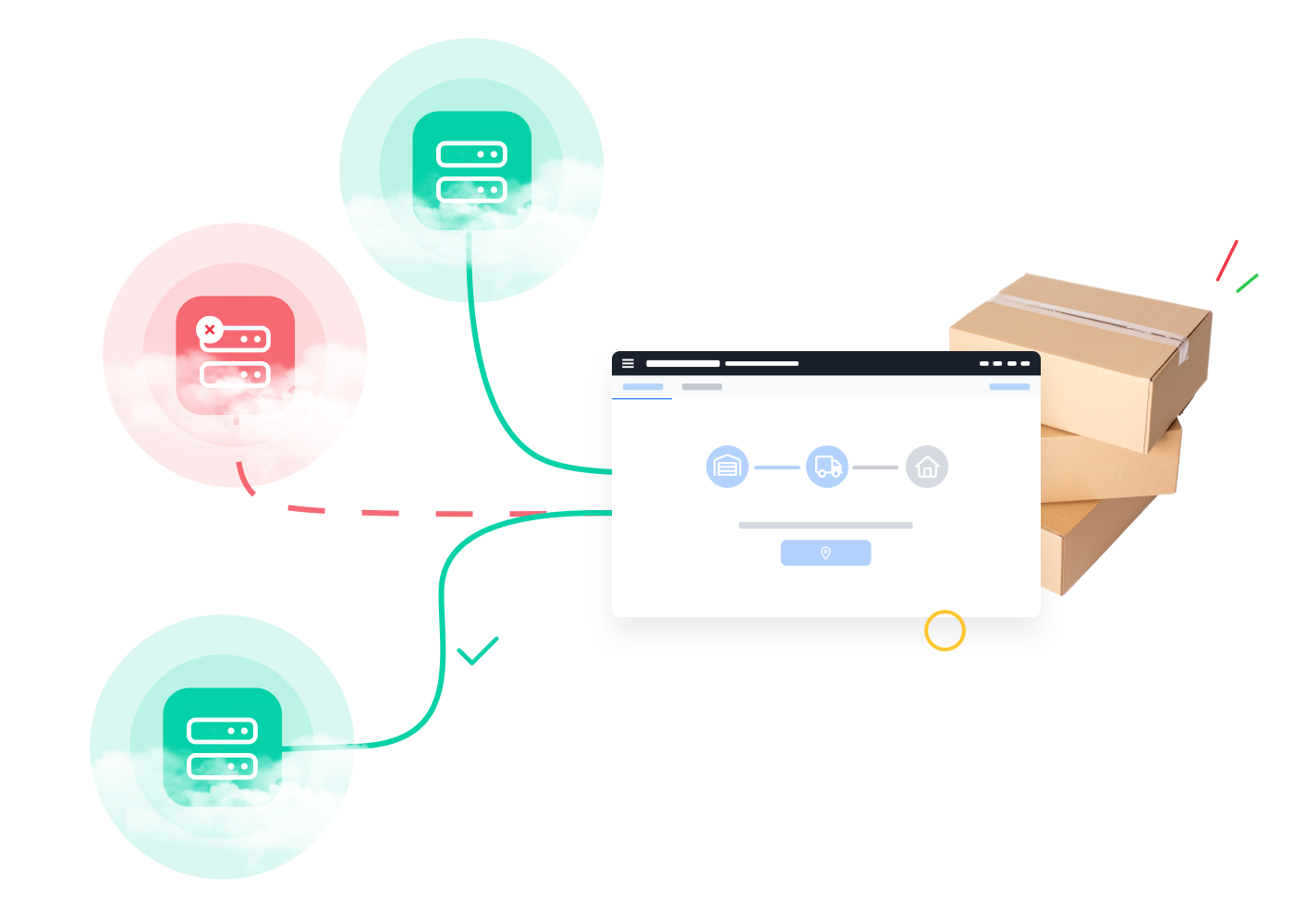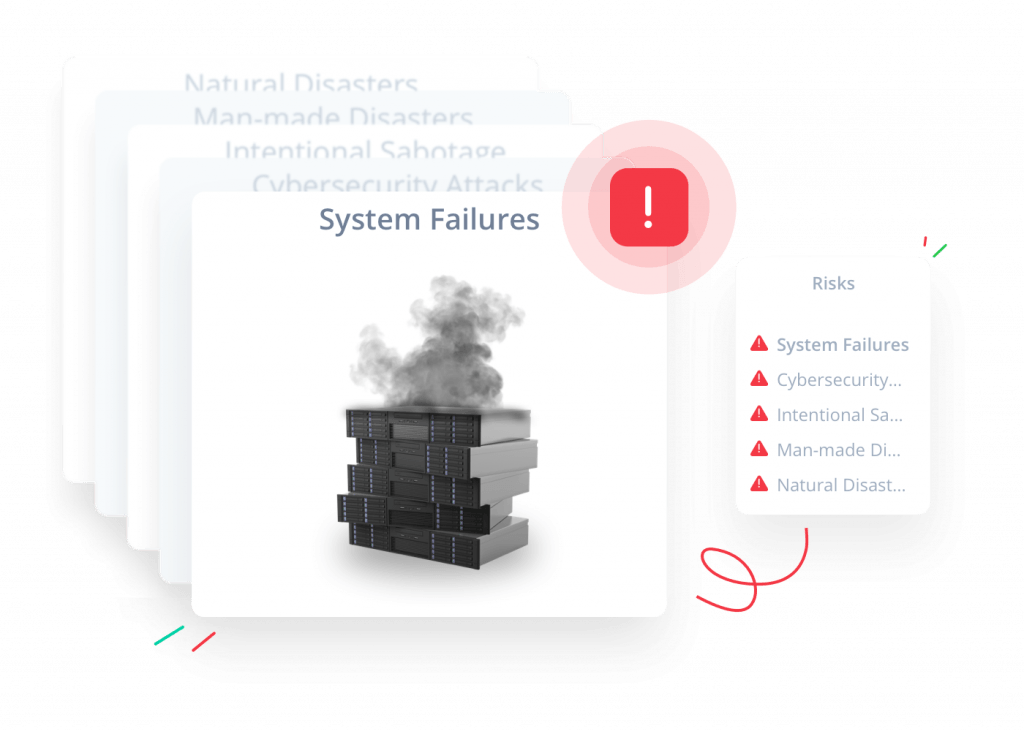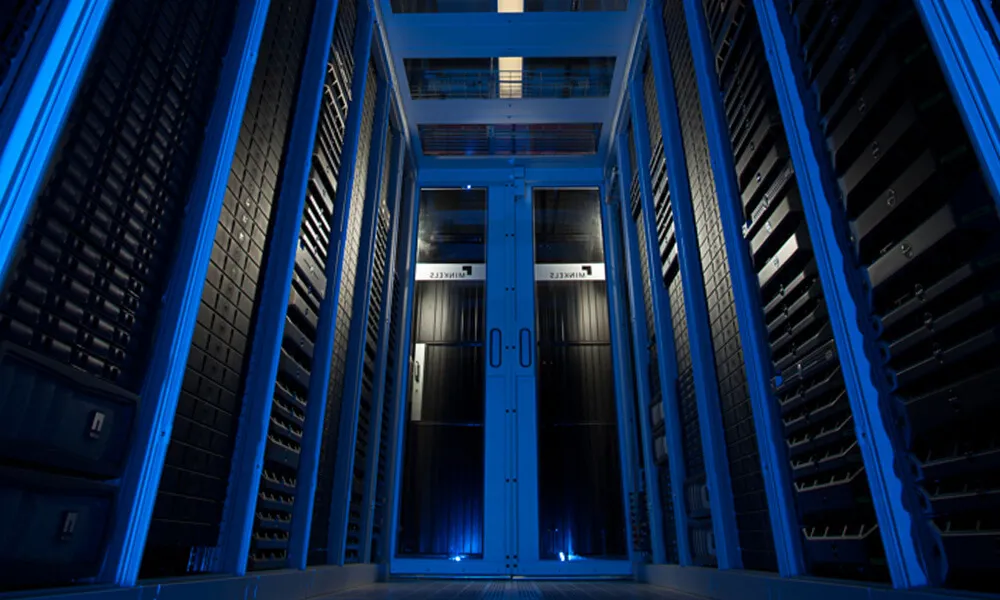What is Business Continuity and why is it important?

Have you been working hard on your own business? Great! But did you know that whole of your business can collapse like a house of cards because of a major disaster or unforeseen problem? That's something you need to avoid at all times! You should therefore opt for Business Continuity. This way your business will always stand solid, even if it shakes on its foundations.
- Business Continuity: its meaning simply explained
- Downtime costs you much money!
- Risks and threats to your business
- Importance of a Business Continuity Plan
- Business Continuity Management Benefits
- Elements of a Business Continuity Plan
- Business Continuity Services from Combell
- Data Protection
- Cloud backup
- Cloud replication
- Availability
- Multi-Datacenter solution
- Disaster Recovery
- Choose Managed Hosting
- Frequently asked questions about Business Continuity

Download our ebook
You never know when disaster may strike. In this e-book, you'll learn some crucial steps you can take to minimize the impact of an unforeseen disaster on your organization's continuity.
Business Continuity: its meaning simply explained
Business Continuity is about the efforts you make to keep your business functioning during a problem or incident. Not drowning, but swimming. That means your employees can still work, business processes continue to run without problems and you have access to key data.
By doing Business Continuity Management (BCM), you can ensure that your workspace is available and that your network, servers, systems, applications and communications resources are not affected by downtime.
Downtime costs you much money!
That word downtime is very important when it comes to Business Continuity. Make your own account for a moment. Can your business still function when you suddenly lose all customer data? When your billing programs are down for a long time? When your staff can't use computers for days on end? Or when your web shop is constantly down? Probably not.
If you want to know what downtime can cost your business, you can quickly calculate it with our online Downtime Cost Calculator. We warn you in advance: expect a hefty bill!
So what is Disaster Recovery?
Business Continuity Management is often referred to as Disaster Recovery. Yet these two solutions are not at all identical.
Disaster Recovery is in fact the next step in getting your business back on track. In this case, a disaster has actually occurred and you have failed to stay operational. You need it when your Business Continuity Plan fails, or lack thereof. Disaster Recovery gets you back in business.
So Disaster Recovery is more reactive, while Business Continuity Management works primarily proactively to keep your business up-and-running at all times.Although Disaster Recovery is just one part of your broader Business Continuity, it's best to pay due attention. Especially if your business is highly dependent on IT systems and data.

Risks and threats to your business
We don't have a crystal ball, so we can't predict what type of disaster could pose a major threat specifically to your business. But, of course, there are several potential risks and threats that can always cause a major impact.
Natural disasters
One of the most important threats is a natural disaster. Think of floods, windstorms, a lightning strike ... Such phenomena can have an immediate impact on your staff, company facilities and (IT) infrastructure. Because once the electricity goes out, you soon find yourself in trouble. Not to mention a fire ...
Cyber attacks
Other major risks occur in the online world. For example, hacking, data breach or some other type of cyber attack. As a business, you are increasingly dependent on technology and digital systems. This brings many benefits, but at the same time it makes you vulnerable to cybercrime.
Because cybercriminals know all too well that not every company is equally advanced in protecting and securing its data and IT environment.
Consequently, there are cyber attacks or attempts at them on a daily basis. If you are a victim, this can lead to major financial consequences, but also data loss, system failure and damage to your reputation. Because will customers still trust you after such an incident?
So, you better take steps to protect your business against such disasters and risks. One way to do that is to have an emergency plan ready, implement thoughtful security measures and evaluate your current business continuity procedures. True, that's not something that can be done in 1,2,3 but a good Business Continuity Plan (BCP) is critical.

Importance of a Business Continuity Plan
Business continuity is ensured with a Business Continuity Plan. It is one (or more) document(s) that describes all possible problems or incidents that could affect your business and also includes a plan to survive them.
These could include natural disasters such as an earthquake, hurricane, tsunami, fire or flood, industrial action, but equally they could include data loss, downtime, cyber attacks, unexpected user spikes ... Those problems or incidents affect your business and profit margin to a greater or lesser extent. And they may lead to bankruptcy if you are not prepared for them.
Example of using a Business Continuity Plan
A Business Continuity Plan is important because it guarantees a quick restart after the event. In addition, with such a plan you identify weaknesses throughout all facets of your organization and determine concrete improvement actions. No two plans are identical; Business Continuity Management is invariably customized.
Business Continuity Management Benefits
Discover some of the major benefits of implementing Business Continuity.
Elements of a Business Continuity Plan
We already mentioned it: a BCP has to be customized. There is no standard formula. Everything depends on what your company looks like in terms of size and structure, services and sector. In general, we see that the following elements are often included in a Business Continuity Plan.
- Goals and structures. What are the priorities of your BCP? Which departments will be involved? What business processes, data and systems are essential to remain operative?
- Risk identification and impact analysis. Try to identify the most likely risks that your company may face as well as estimate the potential impact. An example would be a company located in a flood-prone area.
- Prevention. Document what you do or have planned on a daily basis to mitigate emergencies. For example, customized security, backups ...
- Crisis management. A clear description of the roles, responsibilities and lines of communication of the crisis team responsible for leading emergencies.
- Response and recovery plans. Provide detailed procedures and steps to follow during an emergency, including activating the BCP, restoring systems and data, and resuming your business operations.
- Communication plan. A plan within a plan. You use your communications plan to communicate internally and externally during an emergency. Map out who (customers, partners, upper management, suppliers, employees) needs to be notified when.
- Test and evaluate. Provide tests and evaluations of your Business Continuity Management at regular intervals. In this way, you will identify shortcomings and areas for improvement.
- Training. Provide training and awareness programs to familiarize your employees with the BCP, know their role during emergencies, and have them take the necessary steps at the time of disaster.

Business Continuity Services from Combell
If you want to have your company's Business Continuity designed by external experts, you can collaborate with a Business Continuity Provider such as Combell. Our experienced professionals will guide you from A to Z: from the creation and implementation of your Business Continuity Plan to the protection of your data in case of system failure.
With a Business Continuity Provider, you can count on the necessary knowledge and infrastructure to advise and assist you. What does Combell have to offer? Among other things, a reliable solution for disaster recovery, secure data management, solid backups, cloud replication, duplicated data centers or guaranteed availability of your website or online applications.
Data Protection
Security only makes sense if it covers all layers of your organization. Whether it concerns the physical security of your data centers, malware protection or network security: Combell puts your data under lock and key.
Cloud backup
Your data are regularly copied to a backup and stored in multiple secure locations. It is always accessible to you.
Cloud replication
Cloud replication keeps an exact copy of all your virtual servers in the cloud. It is permanently available to you.
Availability
Your website or online application always and everywhere available? We look for the appropriate solution tailored to your needs and budget.
Multi-Datacenter solution
Redundant infrastructure in multiple locations for guaranteed uptime. That way you stay online, even if things go wrong in one of the data centers.
Disaster Recovery
Disaster Recovery protects your infrastructure and data so that key IT systems are back up and running as quickly as possible after a disaster.

Choose Managed Hosting
Combell puts on different hats without any problem. Also that of Managed Hosting Provider. With Managed Hosting, your Hosting Provider not only takes care of the hardware (the servers), but also of their management (services for maintenance).
Opting for Managed Hosting is worth considering, especially if you are in the process of implementing Business Continuity Management in your business.
You don't want to mis these benefits:
Protect your business with Business Continuity ManagementIt may be clear: Business Continuity keeps your company afloat, even in very difficult circumstances. Therefore, choose - literally - a plan of action that fits your company to perfection.
Talk to Combell and discuss the possibilities. In any case, you can count on our best hosting and cloud solutions.
Moreover, we constantly focus on security, with advanced measures to protect your company data against threats. The scalability and flexibility we offer allow you to quickly add or scale down resources, depending on the needs during an emergency.